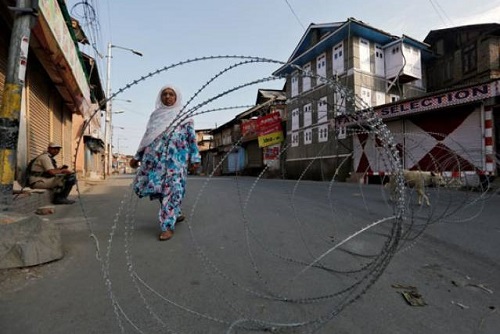Reuters photo
By
Ananya S Guha
There is no doubt that the border confrontation with Pakistan is no longer limited to skirmishes. It is actually a war going on, with almost every day an exchange of fire. Pakistan continues to attack unabashedly with India understandably retaliating. Sushma Swaraj‘s speech in the UN Legislative Assembly, in retort to her counterpart’s was indeed gutsy, but may have been cut short. Two wrongs do not make a right and counter provocation may be just enough to cause further damage. Pakistan’s image in the world is slowly going for a toss even in front of one of her best allies, the U.S., earlier. So the damage control would be: keep a little quieter, hammer out the relevant points, that is all. Instead our External Affairs Minister chose to advise Pakistan and pontificate on India’s developmental progress. That will further more retaliation, which has already begun.
Unless India understands that the focal point of the issue with Pakistan is Kashmir and Kashmir alone, there can be no truce. So what can be done? Win the people of Kashmir over, alienate them from terrorists, draw up a course of massive campaign in the state, get them more into education, start more developmental work and mobilize youth for social and community work. The people of Kashmir, tragically enough are caught in the cross fire of terrorism and the army. The Indian army must act as offering panacea, rather than uttering threats. The politico-civilian lines must be clearly demarcated so that common people do not suffer wantonly. So, if the focal point is Kashmir, then there must be constant stock taking of what is happening there, army intervention, and dialogue between the government’s political partners must be continued regularly in the manner of day to day appraisals and problem solving.
Once India veers to the state of Kashmir only, looking towards peace and developmental activities there, the LoC matter can take a back seat with vigilant activities carried out. Focus on the state, tell the people we are there for you, go into more socio economic measures, and take the people along. Otherwise an already discordant society will be fuelled by politicians of various hues and militants sneaking into the state. The policy should be dual: assuage sentiments and at the same time nab terrorists. Separate terrorism from common people so that they do not feel caught in the cross fire. Tell them they are Indians and they need to be protected from terrorists. Easier said than done, but there should be massive internal propaganda for this. The solutions are: rebuilding education and socio economic and developmental work. Look at road conditions, road connectivity, subsidize rations in villages at least and try to go in for all round developmental work there. Winning over the people is not to raise anti Pakistan slogans but pro Kashmiri ones.
This is perhaps the most crucial phase of Kashmiri negotiations. Earlier India had for sometime negotiated with it as an integral part of the country, but Pakistan hit where it hurts, and coupled with a general apathy towards Muslims in India, if not antipathy, things began to crumble. But rebuilding can be done, a national consensus cutting across party lines should be arrived at. The local government must be given more say in matters of day to day administration and coming up with ideas, in terms of rebuilding economy, society and education.
That brings us to the context of nationalism, precisely nation building. Instead of having these endless debates on nationalism vis-a-vis patriotism, a la Bharat Mata, we should focus on nation building given the obvious flaws there. That cannot be done by shying away from diversity. If diversity has caused social, political, ethnic and religious issues, then these must be tackled. If diversity has caused separatism and demand for state or country then the problems have to be solved by transference: local autonomy as has been done in North Eastern states, power and social economic autonomy or development. Things have improved in certain respects but in Tripura recent developments are not very good augury. Manipur continues to fester.
Nation building in the Indian experiment towards a consolidated nation state still continues after seventy years of freedom. The dialogue is not between nationality and nationalism. The monologue should be nation building underpinned by the diversity of the country. This can be achieved by imaginative policies on developing villages, telecommunications beyond districts to the blocks, educational development focusing on school education, tackling poverty, housing and of course the much talked about cleanliness. There is no need to talk about a developed nation now. Develop it first, housing facilities for the poor should be a priority and track must be kept on sustaining BPL efforts. Nationalism and nation building are perforce realities based on indices of actually taking action on the above rather than falling back upon statistics. When there is actual development this will show.
So introducing a process of development in backward and troubled rife areas is the first step towards nation building, rebuilding and consolidating Nationalism. No amount of intellectual debate will sort out the thorns, a legacy of foreign rule, and financial impropriety, draining of the country’s resources.
Ananya S Guha
Ananya S Guha was born and brought up in Shillong, North East India. He has seven collections of poetry and his poems have been published worldwide. They have also been featured in several anthologies. He is also a columnist, critic and editor. He now is a Regional Director at the Indira Gandhi National Open University and holds a doctoral degree on the novels of William Golding.



No Comments Yet!
You can be first to comment this post!